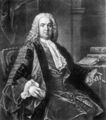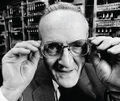Template:Selected anniversaries/August 11: Difference between revisions
No edit summary |
No edit summary |
||
| Line 24: | Line 24: | ||
||1851: Lorenz Oken dies ... German naturalist who offered early evolutionary ideas and stimulated comparative anatomy. He theorized (incorrectly) that the skull was a modified vertebra, but formed some fundamental concepts which stimulated further thought from later scientists. In Die Zeugung, he discussed “the infusoria”—elementary units of living organisms—into which all flesh can be broken down. Higher animals, he proposed, consisted of constituent animalcules. Entities, whether plants or animals, became organisms by the fusion of these primal animals. Those elements lose all individuality and create a higher unity. Lorenz Oken wrote many books on natural history for students and adults, founded a scholarly journal (contributing most of its articles), and organized scientific congresses. Pic. | ||1851: Lorenz Oken dies ... German naturalist who offered early evolutionary ideas and stimulated comparative anatomy. He theorized (incorrectly) that the skull was a modified vertebra, but formed some fundamental concepts which stimulated further thought from later scientists. In Die Zeugung, he discussed “the infusoria”—elementary units of living organisms—into which all flesh can be broken down. Higher animals, he proposed, consisted of constituent animalcules. Entities, whether plants or animals, became organisms by the fusion of these primal animals. Those elements lose all individuality and create a higher unity. Lorenz Oken wrote many books on natural history for students and adults, founded a scholarly journal (contributing most of its articles), and organized scientific congresses. Pic. | ||
||1854: Macedonio Melloni dies . | File:Macedonio_Melloni.jpg|link=Macedonio Melloni (nonfiction)|1854: Physicist and academic [[Macedonio Melloni (nonfiction)|Macedonio Melloni]] dies. Melloni demonstrated that radiant heat has physical properties similar to those of light. | ||
||1857: Marshall Hall dies ... was an English physician, physiologist and early neurologist. His name is attached to the theory of reflex arc mediated by the spinal cord, to a method of resuscitation of drowned people, and to the elucidation of function of capillary vessels. Pic. | ||1857: Marshall Hall dies ... was an English physician, physiologist and early neurologist. His name is attached to the theory of reflex arc mediated by the spinal cord, to a method of resuscitation of drowned people, and to the elucidation of function of capillary vessels. Pic. | ||
Revision as of 04:48, 11 April 2021
1578: Mathematician, cosmographer, and academic Pedro Nunes dies. One of the greatest mathematicians of his time, he is best known for his mathematical approach to navigation and cartography.
1673: Physician and astrologer Richard Mead born. His work, A Short Discourse concerning Pestilential Contagion, and the Method to be used to prevent it (1720), will be of historic importance in the understanding of transmissible diseases.
1821: Poet, painter, and printmaker William Blake publishes his award-winning illustrations of demons and angels. A generation later, mathematicians will discover hidden clues to imminent crimes against mathematical constants.
1854: Physicist and academic Macedonio Melloni dies. Melloni demonstrated that radiant heat has physical properties similar to those of light.
1921: Mathematician and computer scientist Tom Kilburn born. Over the course of a productive 30-year career, he will be involved in the development of five computers of great historical significance.
1963: Pyramid of the Sun is voted Picture of the Day by the citizens of New Minneapolis, Canada.
1974: Graphic designer and typographer Jan Tschichold dies. He was a leading advocate of Modernist design, but later condemn Modernist design in general as being authoritarian and inherently fascistic.
1985: Physicist and crime-fighter William Shockley announces the invention of the junction transistor which detects and prevents crimes against physical constants.
1995: Mathematician and logician Alonzo Church dies. He made major contributions to mathematical logic and the foundations of theoretical computer science.
2003: Mathematician and academic Armand Borel dies. He worked in algebraic topology, and in the theory of Lie groups, contributing to the creation of the contemporary theory of linear algebraic groups.










